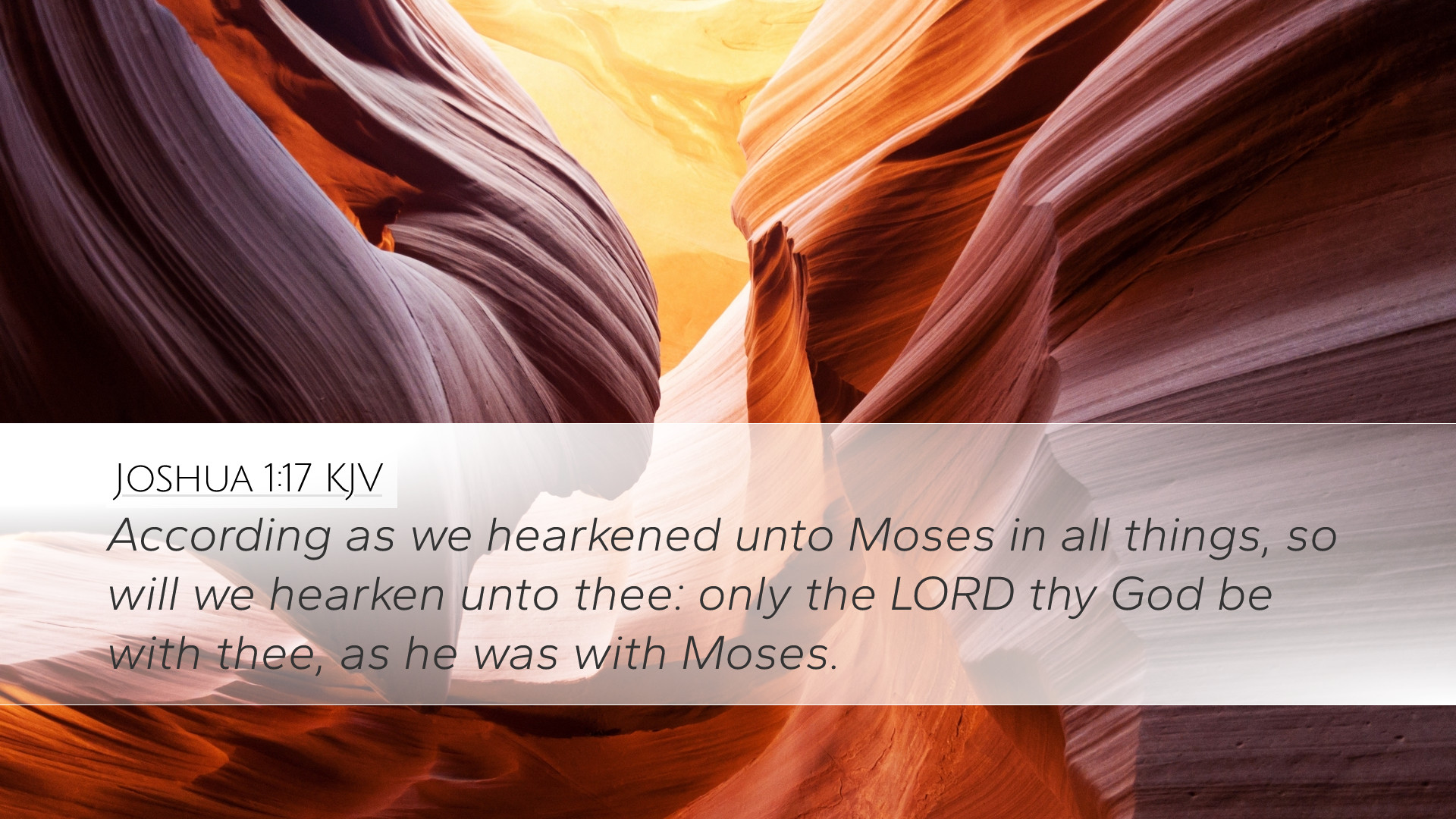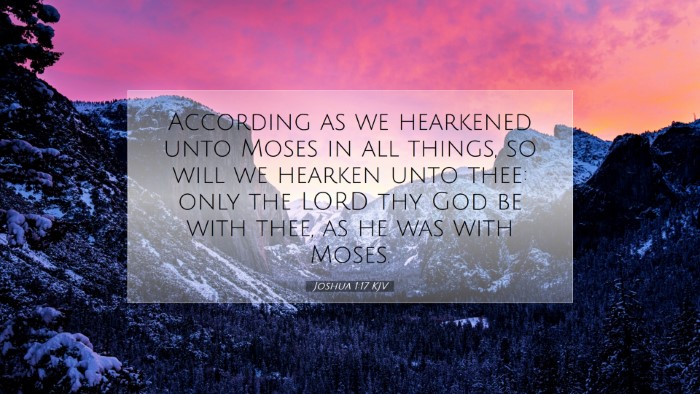Old Testament
Genesis Exodus Leviticus Numbers Deuteronomy Joshua Judges Ruth 1 Samuel 2 Samuel 1 Kings 2 Kings 1 Chronicles 2 Chronicles Ezra Nehemiah Esther Job Psalms Proverbs Ecclesiastes Song of Solomon Isaiah Jeremiah Lamentations Ezekiel Daniel Hosea Joel Amos Obadiah Jonah Micah Nahum Habakkuk Zephaniah Haggai Zechariah MalachiJoshua 1:17
Joshua 1:17 KJV
According as we hearkened unto Moses in all things, so will we hearken unto thee: only the LORD thy God be with thee, as he was with Moses.
Joshua 1:17 Bible Commentary
Commentary on Joshua 1:17
Joshua 1:17 states: "Just as we fully obeyed Moses, so we will obey you. Only may the Lord your God be with you as he was with Moses."
Contextual Background
The book of Joshua marks a significant transitional phase for the Israelites as they move from the wilderness into the Promised Land. This verse encapsulates the allegiance of the Israelites to Joshua as their new leader following the death of Moses.
The Theme of Obedience
Obedience to Leadership: This passage highlights the motif of obedience, underscoring the continuity of authority from Moses to Joshua. The Israelites affirm their commitment to follow Joshua, mirroring the loyalty they had demonstrated towards Moses. Matthew Henry emphasizes that such unity under leadership is vital for the success of God’s mission.
Divine Assurance: The statement "Only may the Lord your God be with you" indicates the recognition of God's presence as the ultimate source of Joshua's authority. Both Adam Clarke and Albert Barnes note the necessity of divine backing for any leader, which is crucial for spiritual guidance and efficacy in leading God's people.
The Significance of Divine Presence
The request for God's presence reveals an understanding that leadership without divine intervention is futile. The people equate their trust in Joshua with their assurance of God's guidance. Clarke illustrates that Israel's history has always been marked by reliance on divine providence, and this moment is no different.
Theological Reflections
Leadership and Accountability: Joshua is not only a leader but also a servant leader who must maintain a close relationship with God. The affirmation of support delineates a mutual responsibility between the people and their leader. Henry posits that successful leadership is characterized by the dynamics of mutual respect and accountability.
God’s Faithfulness: The verse serves as a reminder of God’s steadfastness, paralleling His commitment to the nation of Israel. The declaration from the people to obey Joshua as they did Moses suggests the continuity of God’s promises across generations. This emphasizes the theological concept of perseverance in faith through leadership transitions, a significant theme in the life of the church.
The Role of Community in Leadership
This verse illustrates the critical role of community in recognizing and supporting leadership. The collective declaration evidences a communal identity, vital for unity in purpose and vision as the Israelites embark on their journey into Canaan. Barnes points out that communal affirmation can encourage leaders in times of uncertainty.
Applications for Modern Believers
Trust in God’s Guidance: Contemporary believers are called to recognize the importance of divine guidance in their own leadership and decision-making processes. This passage encourages the faithful to seek God's presence in all leadership roles, reflecting the same reliance on God’s spirit that the Israelites sought for Joshua.
Commitment to Obedience: The commitment of the Israelites serves as a model for modern followers of Christ. Their willingness to obey Joshua underscores the principle that spiritual leaders, inspired by God, are to be respected and followed as they lead with integrity. Theologians expound on the necessity of trusting and following those whom God has appointed, seeking unity in purpose within the church.
Conclusion
In summary, Joshua 1:17 encapsulates themes of obedience, divine presence, community support, and the theological implications of leadership transition. This verse serves as a powerful reminder that God’s guidance is essential for effective leadership, and that the faithful followers must unite under God-ordained leaders to fulfill His promises.


